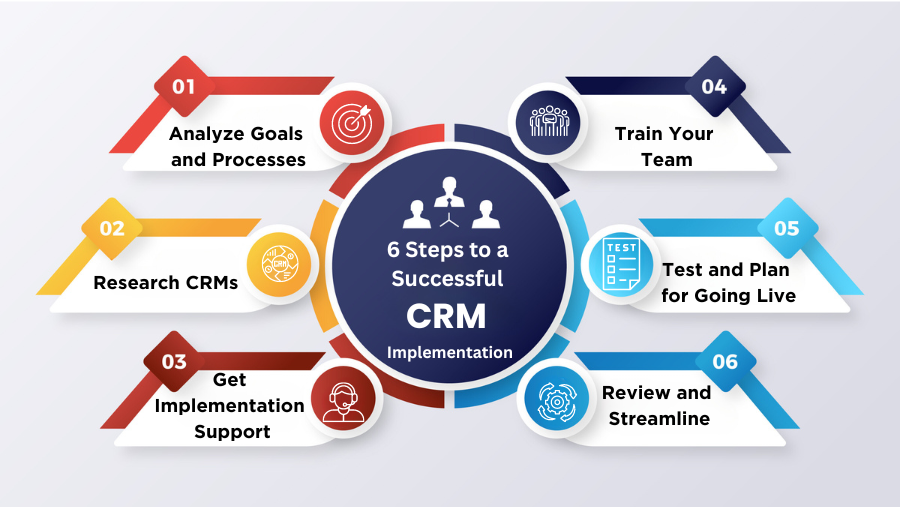When it comes to choosing the right CRM or ERP system, we tend to compare a lot of systems, and most often, Dynamics 365 proves itself to be the most promising option. However, the challenge of implementing it successfully with the help of your Dynamics 365 partner is another step that takes a lot of research, proper strategy, expertise, and the right window of time.
Undoubtedly, Microsoft Dynamics 365 is a flexible solution for various industries and all kinds of business sizes. With the scalable system at hand, you have more freedom and clarity to ensure better outcomes.
Due to its in-depth customer insights, reporting capabilities, and integrated compliance, Dynamics 365 is quite compatible with financial services, too. Now, to maximize the benefits and ensure successful implementation, you need the right approach. So, what are the steps to take? In this guide below, we will discuss the steps you have to take and the challenges you might face during the Microsoft Dynamics CRM implementation plan.
Let’s begin!
What is CRM, and How Does It Work?
A CRM is a system known as an integrated suite of software. The purpose of the system is to help businesses manage customer data and interactions efficiently. It centralizes all the processes, making everything accessible under one platform.
From sales processes to lead management and financial management, all can be automated - lessing the burden of manual work. With CRM in place, customers game real-time insights to make better decisions and improve customer service and experience.
Challenges of Dynamics 365 CRM Implementation
CRM implementation challenges include product cost, selecting the correct solution, deployment style (on-premise or cloud), user adoption, and a lack of integration functionality.
Other than these factors, it requires choosing the right method as well. Every industry has its requirements. So, you need to research, check your needs, and understand the needs of a system that fits your organization.
But Why is methodology important for CRM implementation?
A methodology is a prescriptive statement of the actions that must be completed for a certain project. It involves the application of a set of processes to achieve predictable results.
Methodology is the foundation of project execution. It enables the team to stay on track:
- Better consistency and predictable results.
- Setting clear goals and defining each project step, such as milestones, deliverables, and entry and exit criteria for each phase.
- Defining all the roles and responsibilities of the stakeholders.
- Reducing the possibility of missing crucial activities required for a good outcome.
Steps for Successful Dynamics 365 Implementation
Whatever method you choose after consulting your CRM implementation strategy with your partner, you need to understand the steps you will be taking.

- Understanding the Basics of CRM Implementation
CRM is a significant part of any successful business. A business will see improvement in customer service and sales processes and can automate campaigns using a comprehensive CRM system. However, the implementation of CRM can be quite daunting. So, you need to understand the basics of it. It requires careful steps and thorough planning to ensure seamless integration into the Business process.
- Develop a Budget
Once you understand what CRM means to your business, you must develop a detailed budget. The amount you'll save using Dynamics CRM is determined by your budget and the features you select. Any out-of-the-box system will be beneficial for many organizations.
However, you must determine if the customizable system that comes with extra features justifies the cost or not. Breaking down the cost associated with the implementation and other added features will help you evaluate the overall cost of your CRM. Further, you can understand if it fits your budget plan or not.
Yes, the in-house team may cut the cost, but having a team of experts can be far more beneficial because they bring years of experience and are also already knowledgeable about market dynamics.
A partner can assist in efficiently designing and customizing the solution to match the organization's needs. A partner can also help you integrate it with other corporate systems and provide the necessary training and support to ensure success.
- Creating a Full-Fledged Action Plan
It is necessary to plan thoroughly. Your planning will provide you with a bird's-eye view of the scenario. This clarity will allow you to make adjustments without wasting time. Setting up processes and defining a strategy is essential for Microsoft Dynamics implementation.
A well-thought-out approach will enable you to handle better materials, workflows, time, and the financial element of the project, resulting in a seamless Dynamics 365 launch.
- Allocate the Right Resources for the Rroject
When we allocate resources, there are usually 2 perspectives, and one must see through both.
As an implementor, you must consider the industry before assigning any resources. Teams with industry-specific knowledge are more inclined to suggest ideas as they have already participated in similar projects. An experienced professional can tell you about the major mistakes and offer better expertise than anyone interacting with such an industry for the first time.
In this case, both the customer and the implementer understand each other and are on the same page. Understanding client processes might sometimes be more difficult than actually implementing these procedures in the CRM during deployment.
From the customer's viewpoint, ensuring that the implementation team members have the necessary technical understanding, can make decisions, and can play the essential user role during the testing phases is paramount.
There are times when individuals involved in the implementation are not members of the main user group that will use the product. This can result in significant disparities between the procedures that are implemented and the processes that business users require.
- Understand Microsoft Dynamics 365’s Capabilities
Once you have developed the sense of the beginning of your project, assuming you are choosing Dynamics 365, you must know its capabilities and how they benefit your business. You can consult your partner about it or refer to Microsoft directly. Consultants can help you in person by asking questions and understanding your industry. They review your industry and solution together to further advise you on the suitability of features for your company.
- Conduct a Process Review
Take the time to look into your current processes and procedures within the organization. Creating maps of your present business processes is also a good opportunity. Good documentation of processes will save a significant amount of time during implementation. Reports, technical documents, Scope of projects, and everything should be reviewed before implementing a new one.
- Assess Current Systems and Tools
Make a list of all the software programs in each business unit that will be included in your scope. Is everything updated with the most recent software patches? You should ensure that the systems you have in place are easily integrated with D365. At this time, it's also important for your team to look ahead and become acquainted with the new solution.
- Prepare for Data Migration
Is it clear by now? Then, prepare for data migration. The CRM implementation plan demands migrating data into a new system at this stage. However, to begin with, the data must be cleaned and prepared for this to be done efficiently and extensively. Data mapping may also be required to guarantee the data is ready for import into the new system.
- Cleanse Your Data
Evaluate the level of your data quality, determine what data will be migrated to Dynamics 365, and then remove any old, redundant, or irrelevant information. Remember that your system is only as valuable as its data, so ensure everything is as accurate as possible from the outset. Data cleansing is frequently time-consuming and requires a collaborative effort throughout the organization. After extensively reviewing and polishing your data, ensure it is referenceable and available for your implementation.
- Test and Train
Ask, What is your company's testing procedure? Plan for a small group of end users to assist with testing to ensure that each role in your firm can perform its duties successfully in the new system. Provide them with Dynamics 365 login credentials and slowly start making it a part of your organization. Meanwhile, stay open for user feedback. This will also give your team a hands-on opportunity to study D365 before the go-live date.
- Constantly Enhance And Optimize
The optimization and upgrading of the CRM solution are ongoing operations. Encourage and use user and stakeholder feedback to inform changes. Always analyze the solution and search for improvement opportunities to ensure it still serves your company's needs.
- Keep Up With New Features And Updates
Microsoft Dynamics CRM is always being updated with new capabilities and features. Keep up with these developments and use the new features to improve your CRM solution. Careful planning, a personalized strategy, ongoing monitoring, and continuous improvement are required to improve your Microsoft Dynamics CRM implementation.
Applying these strategies ensures that your CRM solution meets your company's needs, supports growth, and leads to success.
Role of AI and BI in Dynamics 365 Implementation
Now, you may follow the simple steps for CRM implementation. But remember, AI is already here and is a huge part of these systems. Dynamics 365, however, includes built-in Artificial Intelligence (AI) technologies that provide predictive insights and assist businesses in making educated decisions.
Also, its integration with Power BI offers powerful data analytics, assisting businesses in transforming data into actionable insights. Adopting these characteristics during deployment will provide your company with a powerful weapon for success.
Bottom Line - Measure the Success of Projects
Success metrics are useful because they provide insight into micro and macro project health patterns. Tracking success metrics for a single project allows stakeholders to analyze the project's overall health at a glance. Similarly, measuring performance across several projects allows the partner or the customer project team to identify patterns affecting their CRM implementation plan.
Access to valuable data enables Microsoft or the partner to determine whether the issue is a project or product issue and obtain insights into how to resolve it. Ultimately, if you need a partner whose experience can bring value to your project, Exhortek has the finest record in various industries for providing CRM Implementation Services; reach out to us now for more!








0 Comments